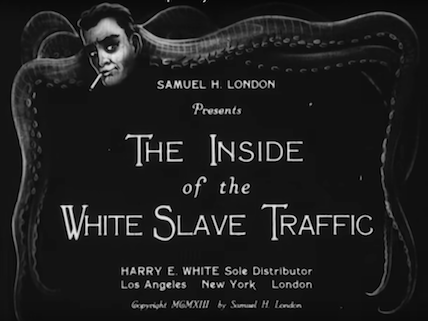White Slavery: The Movie
Friday A/V Club: A moral panic from the Progressive Era

In my post about PizzaGate earlier today, I mentioned the "white slavery" scare of the Progressive Era, when wild stories circulated of vast conspiracies coercing young women into prostitution. Forced prostitution did exist, of course, but these tales greatly exaggerated both how common and how organized it was. As is often the case, the moral panic manifested itself at the movies.
The white-slavery film cycle began with George Loane Tucker's 1913 hit Traffic in Souls; the second major entry was Frank Beal's The Inside of the White Slave Traffic, released the same year. The latter is embedded below. Unfortunately, some scenes from the movie are lost, so additional intertitles have been inserted to describe what happens in the missing sections.
In brief, the picture tells the story of a girl who is tricked into a fake marriage with a procurer for a sex-trafficking ring, who then ships her off to be a whore in New Orleans. She tries to break free, fleeing to Denver and Houston, but everywhere she goes she is tracked by the enormous sex syndicate. Unable to find any other job, she finally submits.
One of the odder twists comes when she then falls into a conversation with a potential john. A policeman interrupts them, lets the man walk away, and hauls our heroine off to jail. The film disapproves: A placard says, "One law for man—Another for woman." But it just disapproves of the man walking free: The arrest appears to be a good thing, since it leads to the woman's rehabilitation. After her imprisonment, she finally gets a respectable job. (Then she slides back into prostitution and dies. Not a cheery movie!)
Like many other "educational" films over the years, The Inside of the White Slave Traffic opens with an earnest-sounding declaration of serious intent before proceeding to the salacious story. The reaction was similarly bifurcated: Anti-vice activists promoted it, but police shut down some screenings on the grounds that the picture was obscene. Judge for yourself:
The opening includes a list of people who have endorsed the film, ending with a dubious invocation of "every Sociologist of note from Atlantic to Pacific." If you know your Progressive Era history, some of those names may be familiar to you. Charlotte Perkins Gilman, a prominent feminist, was the author of Herland, a utopian science fiction novel in which an all-female society reproduces parthenogenetically. And Frederic Howe had a long career as a reformer, at various stages becoming everything from a Henry Georgist to a New Dealer; his 1906 book Confessions of a Monopolist has a small libertarian fan base. For the purposes of this picture, though, his most relevant credential may be that he was director of the National Board of Censorship.
(For past editions of the Friday A/V Club, go here.)


Show Comments (16)